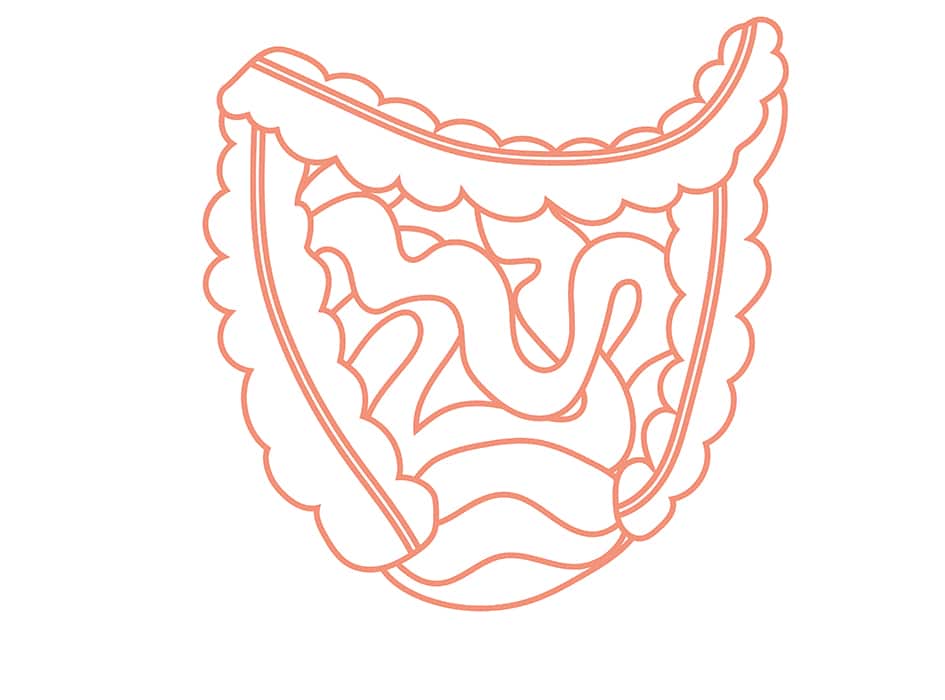
For those of you who are following my journey through the human body, the things that can go wrong and what to do about them, this month is all about bowel awareness. Or more accurately, the gastro-intestinal tract.
First, a quick whistle-stop journey of the food you put in your mouth and chew. The bolus (food that has been chewed and mixed in the mouth with saliva) is swallowed and a wave of muscular activity takes it to the stomach down the oesophagus in seconds where acid mixes with the food, enzymes start to break the food down, and it is squirted into the small bowel over several hours.
The first part of the small bowel, the duodenum, is joined by the tube from the liver, gallbladder, and pancreas, which sends green bile, pancreatic juices and more enzymes to complete digestion. The food is broken down completely and all the good stuff is absorbed in the rest of the small bowel.
On your right side, right down where the small bowel joins the large bowel, there is a valve right next to the appendix, which allows the liquid residue to pass into the large bowel where water is absorbed and the semi-solid waste, the faeces, is passed out through your rectum and anus.
So, what can go wrong in adult life? Which are the serious symptoms to act on quickly?
From the top down: Swallowing difficulty – so called dysphagia needs to be checked. There are lots of causes but a blockage amenable to treatment is the number one to exclude. For some reason oesophageal cancer has become much more common and we need to be vigilant.
As we enter the stomach, indigestion that is not settling on tablets or associated with weight loss and anaemia particularly in middle age or older, needs an endoscopy. This is a simple test that takes about five minutes and can be done while you are awake or sedated.
Still in the stomach and duodenum, vomiting black stuff like coffee grounds is s sign of a bleeding ulcer and, if associated with passing dark black motions rectally, is an absolute emergency. The two commonest causes for vomiting blood or coffee grounds are bleeding ulcers and varicose veins in the lower oesophagus (varices), usually associated with the demon drink, and liver disease, in the form of cirrhosis. The clever stomach specialists through their endoscopes can inject bleeding ulcers with adrenaline, and put clips on bigger ulcers. The varices in the oesophagus can have elastic bands put on them or be injected. The varices are really serious, as they represent very advanced liver problems, particularly as often the patient continues to drink alcohol.
Enter the rest of the small bowel. Here we have Inflammatory bowel disease and Coeliac disease. Both can start with diarrhoea, abdominal pain, weight loss and anaemia. Coeliac disease runs in families, is common in Ireland, can cause problems at any age, and is easily diagnosed with a blood test and maybe a small bowel biopsy. You probably already know that it is caused by a sensitivity to gluten, which makes food nice to chew and palatable; and this has to be excluded from the diet forever.
To go on a gluten-free diet on a whim or because it is trendy has no scientific basis at all.
Crohn’s disease is a condition where one’s immunity attacks the bowel, usually the small bowel, but it can affect the whole length. Sometimes it mimics appendicitis, sometimes it causes bleeding and obstruction. Again it is diagnosed with blood tests, endoscopy and looking at a stool specimen to look for inflammatory markers called calprotectins. Interestingly, it is strongly associated with smoking.
Enter the large bowel. You all know about appendicitis and how this can be a difficult one to diagnose. Pain starting around the belly button moving down to the right lower abdomen associated with tenderness, temperature, and going right off your grub, is a classic presentation. A blood count looking for a high white cell count and evidence of inflammation, a C reactive protein level (CRP), again is classic, but so many patients I see have not read the text books and it can be a tricky diagnosis particularly in the young and elderly!
In the large bowel, we still have inflammatory bowel disease; Crohns is there and its cousin Ulcerative Colitis which, as its name implies, cause ulcers in the large bowel, bleeding and pain. This is more common in non-smokers!
Most of us also end up with small pouches on the large bowel called diverticulae, which can be painful (diverticulosis) and like the appendix can get blocked, infected and form an abscess. So-called diverticulitis.
I suppose the big one not to miss is bowel cancer. Clues? A family history of bowel polyps and its sequel, cancer, needs to be screened for by means of regular colon examination. A change in bowel habit, having mucus and blood in the motions needs to be looked into. Bowel cancer starts off as a small strawberry like polyp, which if left for several years, can develop into a life-threatening cancer, so snipping off a polyp that is causing early symptoms saves your life or saves you from a major operation later. So keep an eye on your motions!
The HSE operates a screening test for early bowel cancer. It is a great idea and so simple to do, but many don’t get involved out of embarrassment or simply because they just can’t be bothered.
I see many elderly patients in hospital with diarrhoea. This tips the frail patient who is coping at home into a non-coping situation. The first thing we do is look at the patient’s tablets. They are usually on far too many! The patient has mild blood pressure so a tablet is given that causes ankle swelling; a water tablet is then prescribed, which leads to incontinence, so a bladder tablet is given. A urinary tract infection is diagnosed. A urinary tract infection is actually quite rare in the elderly. An antibiotic is prescribed, which then causes diarrhoea. Hello ambulance…
The patient ends up in the Emergency Department with me. This is called the prescribing cascade and such an easy trap to fall into particularly when several specialists are involved. It is called polypharmacy and a careful review of all medicines by your doctor, particularly in the frail and elderly is so important. We sometimes have to decide what is really important to treat and weigh up the balancing act of risk versus benefit, which is not easy with the newer high-tech medicines.
I know I have not covered Irritable Bowel Syndrome (IBS), which can mimic serious disease and when all is said and done can really only be diagnosed when the big stuff has been excluded. A history, blood and faecal test usually gets the diagnosis. Treatment here can be difficult however, as it is poorly understood.
So that completes the journey through your bowels…I hope I have signposted some important conditions and the symptoms to act on.



